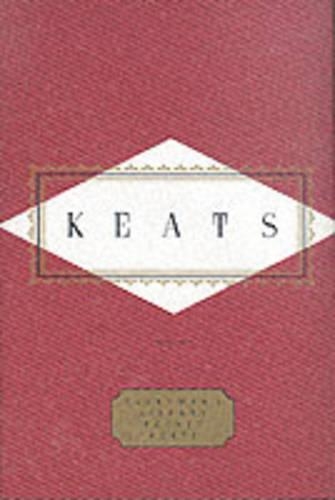
Selected Poems
(Hardback)
Available Formats
Hardback
Published: 27th May 1994
Paperback
Published: 26th April 2007
Hardback
Published: 12th February 2019
Publishing Details
Selected Poems
By (Author) John Keats
Everyman
Everyman's Library
27th May 1994
7th April 1994
United Kingdom
Classifications
General
Non Fiction
821.7
Physical Properties
Hardback
256
Width 111mm, Height 165mm, Spine 18mm
230g
Description
An exciting addition to Everyman's Library- a new series of small, handsome hardcover volumes devoted to the world's classic poets. Our books have twice as many pages as Bloomsbury Classics' 128pp and cost 7. 99 against Bloomsbury's 9. 99. The binding, paper and production is visibly superior in every way to that of Bloomsbury. Keats is celebrated as a writer in three forms- lyric verse, narrative verse and letters. All three are represented here in a volume which reprints all the famous odes, a selection os sonnets and other short poems, both versions of HYPERION, extentsive selections from ENDYMION, and the complete ISABELLA, LAMIA and THE EVE OF ST. AGNES. Finally, there-are letters in which Keats discusses his attitude to poetry and to other poets.
Author Bio
John Keats was born in London in 1795. He trained as a surgeon and apothecary but quickly abandoned this profession for poetry. His first volume of poetry was published in 1817, soon after he had begun an influential friendship with the Romantic poet Percy Bysshe Shelley. His first collection and the subsequent long poem Endymion recieved mixed reviews, and sales were poor. In late 1818 he moved to Hampstead where he met and fell deeply in love with his neighbour Fanny Brawne. During the following year Keats wrote some of his most famous works, including 'The Eve of St. Agnes', 'Ode to a Nightingale' and 'La Belle Dame sans Merci'. He was however increasingly plagued by ill-health and financial troubles, which led him to break off his engagement to Fanny. Soon after the publication of Lamia, Isabella, The Eve of St Agnes and Other Poems in 1820, Keats left England for Italy in the hope that the climate would improve his health. But Keats was by this time suffering from advanced tuberculosis, and he died on February 23rd 1821. On his request, Keats' tombstone reads only 'Here lies one whose name was writ in water'.
